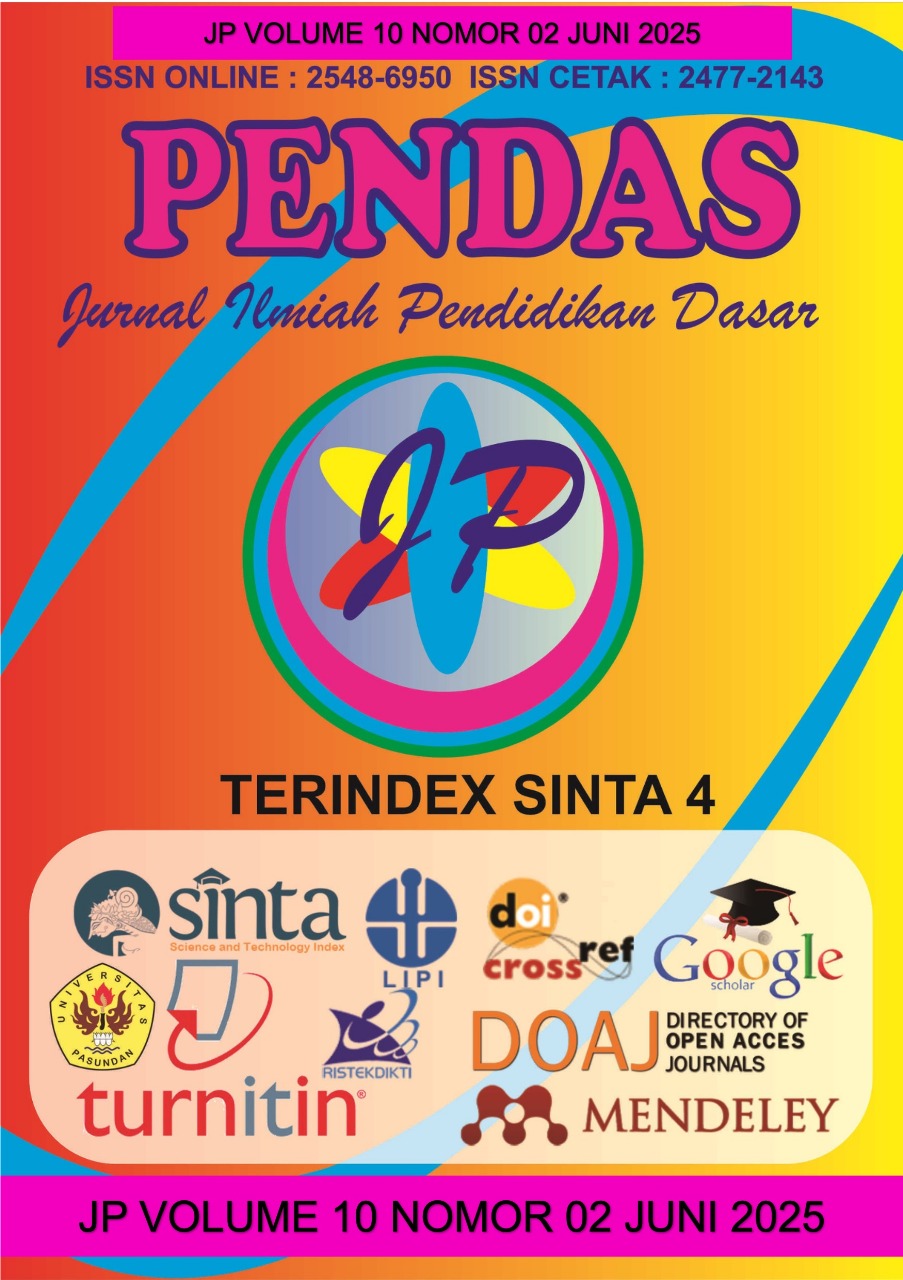PENGARUH PENERAPAN MODEL PEMBELAJARAN PROBLEM BASED LEARNING TERHADAP PEMAHAMAN SISWA MENGENAI HAK DAN KEWAJIBAN SISWA SEKOLAH DASAR SEBAGAI WARGA NEGARA DI SDN 1 MANIKYANG
DOI:
https://doi.org/10.23969/jp.v10i2.23656Keywords:
rights and responsibilities of citizens, students’ understanding, problem based learningAbstract
This study aims to analyze the effect of implementing the Problem-Based Learning (PBL) model on students’ understanding of rights and responsibilities as citizens at SDN 1 Manikyang. The research employed a quasi-experimental method using a pretest-posttest control group design. The sample consisted of two classes: the experimental class, which was taught using the PBL model, and the control class, which was taught using conventional teaching methods. Data were collected through pretest and posttest assessments and analyzed using descriptive and inferential statistical tests. The research findings indicate a significant improvement in the experimental class after implementing the PBL model. The average pretest score of the experimental class was 68.42, which increased to 79.19 in the posttest. In contrast, the control class had an average pretest score of 67.2, which slightly declined to 65.7 in the posttest. Statistical analysis confirmed that the difference in understanding improvement between the two classes was significant, demonstrating the effectiveness of the PBL model in enhancing students' comprehension of their rights and responsibilities as citizens. This improvement can be attributed to the active learning characteristics of the PBL model, which encourages students to think critically, engage in discussions, and seek solutions to real-life problems. Thus, problem-based learning can be an effective alternative instructional strategy for improving students’ understanding of Civic Education at the elementary school level.
Downloads
References
Barrows, H. S. (1986). A taxonomy of Problem-Based Learning methods. Medical Education, 20(6), 481–486. https://doi.org/10.1111/j.1365-2923.1986.tb01386.x
Depdiknas. (2020). Kurikulum pendidikan dasar. Jakarta: Kementerian Pendidikan dan Kebudayaan.
Eldy, E.F. and Sulaiman, F. (2013). The Role of PBL in Improving Physicc Students’ Creative Thinking and Its Imprint on Gender. Education and Research. Vol.1 No.6 Juni 2013. Hlm. 1- 10.
English, M. C. and Kitsantas, A. 2013. Supporting Student Self-Regulated Learning in problem & based
Gallagher, S.A. and Gallagher, J.J. (2013). Using Problembased Learning to Explore Unseen Academic Potential. Interdisiplinary Journal of Problembased Learning. Vol.7 No.1 Maret 2013. Pp.
Hlm.128-150.
Hmelo-Silver, C. E. (2004). Problem-Based Learning: What and how do students learn? Educational Psychology Review, 16(3), 235–266. https://doi.org/10.1023/B:EDPR.0000034022.16470.f3
Ibrahim, M. (2012). Pembelajaran Berdasarkan Masalah. Surabaya: Unesa University Press.
Ibrahim, M. (2012). Pembelajaran Berdasarkan Masalah. Surabaya: Unesa University Press.
Jakarta learning. Interdisciplinary Journal of Problembased Learning. Vol.7 No.2 Mei 2013.
Johnson, D. W., & Johnson, R. T. (2019). Cooperative Learning: Improving University Instruction by Basing Practice on Validated Theory. Journal on Excellence in University Teaching, 30(2), 1–15.
Nur, M. (2011). Model Pembelajaran Berdasarkan Masalah. Surabaya: Pusat Sains dan Matematika Sekolah UNESA.
Sagala, S. (2009). Konsep dan Makna Pembelajaran. Bandung: Alfabeta.
Sari, A., Nugroho, D., & Wicaksono, R. (2021). Implementasi Model Pembelajaran Berbasis Masalah dalam Meningkatkan Keterampilan Berpikir Kritis Siswa. Jurnal Pendidikan Kewarganegaraan, 10(1), 55–68.
Soemarsono, S. dan H. Mansyur. (2002). Pendidikan Kewarganegaraan. Gramedia Pustaka Utama:
Sugiyanto. (2020). Pengaruh Model Pembelajaran Berbasis Masalah terhadap Pemahaman Konsep Sosial dan Kewarganegaraan Siswa Sekolah Dasar. Jurnal Pendidikan Dasar, 8(2), 112–125.
Sugiyono. (2012). Metode Penelitian Kuantitatif Kualitatif dan R&D. Bandung: Alfabeta, CV
Suryadi, A. (2019). Efektivitas model pembelajaran dalam meningkatkan pemahaman siswa. Jurnal Pendidikan Indonesia, 8(2), 112–123.
Tilaar, HAR. (2001). Manajemen Pendidikan Nasional. Bandung: PT Remaja Rosda Karya.
Trianto. (2010). Mendesain Model Pembelajaran Inovatif Progresif. Surabaya: Kencana Prenada media Group.
Downloads
Published
Issue
Section
License
Copyright (c) 2025 Pendas : Jurnal Ilmiah Pendidikan Dasar

This work is licensed under a Creative Commons Attribution 4.0 International License.














































